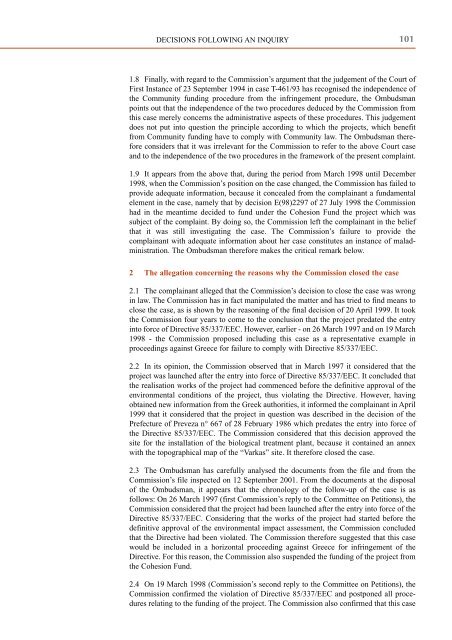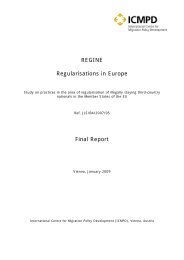Annual report 2002 - EOI
Annual report 2002 - EOI
Annual report 2002 - EOI
You also want an ePaper? Increase the reach of your titles
YUMPU automatically turns print PDFs into web optimized ePapers that Google loves.
DECISIONS FOLLOWING AN INQUIRY 101<br />
1.8 Finally, with regard to the Commission’s argument that the judgement of the Court of<br />
First Instance of 23 September 1994 in case T-461/93 has recognised the independence of<br />
the Community funding procedure from the infringement procedure, the Ombudsman<br />
points out that the independence of the two procedures deduced by the Commission from<br />
this case merely concerns the administrative aspects of these procedures. This judgement<br />
does not put into question the principle according to which the projects, which benefit<br />
from Community funding have to comply with Community law. The Ombudsman therefore<br />
considers that it was irrelevant for the Commission to refer to the above Court case<br />
and to the independence of the two procedures in the framework of the present complaint.<br />
1.9 It appears from the above that, during the period from March 1998 until December<br />
1998, when the Commission’s position on the case changed, the Commission has failed to<br />
provide adequate information, because it concealed from the complainant a fundamental<br />
element in the case, namely that by decision E(98)2297 of 27 July 1998 the Commission<br />
had in the meantime decided to fund under the Cohesion Fund the project which was<br />
subject of the complaint. By doing so, the Commission left the complainant in the belief<br />
that it was still investigating the case. The Commission’s failure to provide the<br />
complainant with adequate information about her case constitutes an instance of maladministration.<br />
The Ombudsman therefore makes the critical remark below.<br />
2 The allegation concerning the reasons why the Commission closed the case<br />
2.1 The complainant alleged that the Commission’s decision to close the case was wrong<br />
in law. The Commission has in fact manipulated the matter and has tried to find means to<br />
close the case, as is shown by the reasoning of the final decision of 20 April 1999. It took<br />
the Commission four years to come to the conclusion that the project predated the entry<br />
into force of Directive 85/337/EEC. However, earlier - on 26 March 1997 and on 19 March<br />
1998 - the Commission proposed including this case as a representative example in<br />
proceedings against Greece for failure to comply with Directive 85/337/EEC.<br />
2.2 In its opinion, the Commission observed that in March 1997 it considered that the<br />
project was launched after the entry into force of Directive 85/337/EEC. It concluded that<br />
the realisation works of the project had commenced before the definitive approval of the<br />
environmental conditions of the project, thus violating the Directive. However, having<br />
obtained new information from the Greek authorities, it informed the complainant in April<br />
1999 that it considered that the project in question was described in the decision of the<br />
Prefecture of Preveza n° 667 of 28 February 1986 which predates the entry into force of<br />
the Directive 85/337/EEC. The Commission considered that this decision approved the<br />
site for the installation of the biological treatment plant, because it contained an annex<br />
with the topographical map of the “Varkas” site. It therefore closed the case.<br />
2.3 The Ombudsman has carefully analysed the documents from the file and from the<br />
Commission’s file inspected on 12 September 2001. From the documents at the disposal<br />
of the Ombudsman, it appears that the chronology of the follow-up of the case is as<br />
follows: On 26 March 1997 (first Commission’s reply to the Committee on Petitions), the<br />
Commission considered that the project had been launched after the entry into force of the<br />
Directive 85/337/EEC. Considering that the works of the project had started before the<br />
definitive approval of the environmental impact assessment, the Commission concluded<br />
that the Directive had been violated. The Commission therefore suggested that this case<br />
would be included in a horizontal proceeding against Greece for infringement of the<br />
Directive. For this reason, the Commission also suspended the funding of the project from<br />
the Cohesion Fund.<br />
2.4 On 19 March 1998 (Commission’s second reply to the Committee on Petitions), the<br />
Commission confirmed the violation of Directive 85/337/EEC and postponed all procedures<br />
relating to the funding of the project. The Commission also confirmed that this case
















